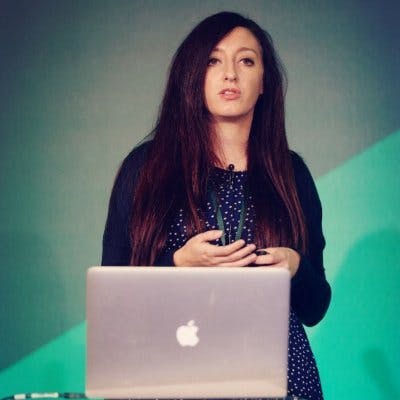OpenJS World – Featured Profile – Beth Griggs
Since 2016, Beth Griggs has been working as an Open Source Engineer at IBM where she focuses on the Node.js runtime.

OpenJS World – Featured Profile – Beth Griggs
Since 2016, Beth Griggs has been working as an Open Source Engineer at IBM where she focuses on the Node.js runtime. Node.js is an impact project in the OpenJS Foundation. Beth is a Node.js Technical Steering Committee Member and a member of the Node.js Release Working Group where she is involved with auditing commits for the long-term support (LTS) release lines and the creation of releases.
What was your first experience of Node.js?
I joined the party a little late, my first experience of Node.js was while completing my final-year engineering project for my Bachelor’s degree in 2016. My engineering project was to create a ‘living meta-analysis’ tool that would enable researchers, specifically psychologists, to easily combine and update findings from related independent studies. I originally implemented the tool using a PHP framework, but after some time I realized I wasn’t enjoying the developer experience and hitting limitations with the framework. Half-way through my final year of university, I heard some classmates raving about Node.js, so I decided to check it out. Within a few weeks, I had reimplemented my project from scratch using Node.js.
How did you start contributing to Node.js?
I rejoined IBM in 2016, having spent my gap-year prior to university at IBM as Java Test Engineer in their WebSphere organization. I joined the Node.js team in IBM Runtime Technologies who at the time were responsible for building and testing the IBM SDK for Node.js. From running the Node.js test suite regularly internally, my team identified flaky tests that needed fixing out in the community – which turned in to some of my first contributions to Node.js core.
Over the next few years, our team deprecated the IBM SDK for Node.js in favor of maintaining these platforms directly in the Node.js community. Around the same time, Myles Borins offered to mentor me to become involved with the Release Working Group, with a view of becoming a Node.js releaser (Thanks Myles!). Since then, that’s the area of Node.js where most of my contributions have been focused.
What has changed since you first started to contributing to Node.js?
One of the biggest changes is the emphasis on onboarding new contributors to major parts of the project. Getting new names and faces onboarded in a position where they can actively contribute to Node.js, and also an increase in socializing how people can contribute in ways other than code.
Documentation of the internal contributor processes has improved a lot too, but there’s still room to improve.
What are you most excited about with the Node.js project at the moment?
I’m really enjoying the work that is happening in pkgjs GitHub organization where we’re building tools for package maintainers. I’m excited to see the tools that come out of pkgjs organization and the Node.js Package Maintenance team.
What are you most looking forward to at OpenJS World?
There are so many great talks (although, I’m a little bias as I was in the content team). I’m really looking forward to the keynote with Christina H Koch, a NASA astronaut. And also, the ‘Broken Promises’ workshop by James and Matteo from NearForm.
On the Cross Project Summit day, I’m looking forward to the Node.js Package Maintenance session. We’ve got a lot of momentum in that working group at the moment and it’ll be great to have input from the other OpenJS projects. I’m hoping my talk “Chronicles of the Node.js Ecosystem: The Consumer, The Author, and The Maintainer” is a good primer for the session.
I’ll also be at the IBM virtual booth throughout the conference and catching my colleagues’ talks (https://developer.ibm.com/technologies/node-js/blogs/ibm-at-openjs-world-2020).
What does your role at IBM include other than contributing to the Node.js community?
A wide variety of things really, no week is ever full of the same tasks. I’m often preparing talks and workshops for various conferences. Alongside that, I spend my time researching common methods and best practices for deploying Node.js applications to the cloud – specifically focusing on IBM Cloud and OpenShift. I often find myself assisting internal teams with their usage of Node.js, and analyzing various IBM offerings from a typical Node.js Developer’s point of view and providing feedback. I’m also scrum master for my team, so a portion of my time is taken up with those responsibilities too.
What do you do outside of work?
Most often hanging out with my dog, Laddie. I’m a DIY enthusiast – mainly painting or upcycling various pieces of second-hand furniture. Since the start of lockdown in the UK, I have also been writing a book which is a convenient pass time. Big fan of replaying my old PS1 games too.
Where should people go to get started contributing to the Node.js Project?
Go to https://www.nodetodo.org/, which is a website that walks you through a path towards your first contribution to Node.js. As long as you’re a little bit familiar with Node.js, you can start here. The other option is to look for labels on repositories in the Node.js GitHub organization tagged with ‘Good first issue’.
Alternatively, you can join one of our working group sessions on Zoom and start participating in discussions. The sessions are listed in the nodejs.org calendar. If you’re specifically interested in the Node.js Release Working Group, I run fortnightly mentoring/shadowing sessions that you’re welcome to join.